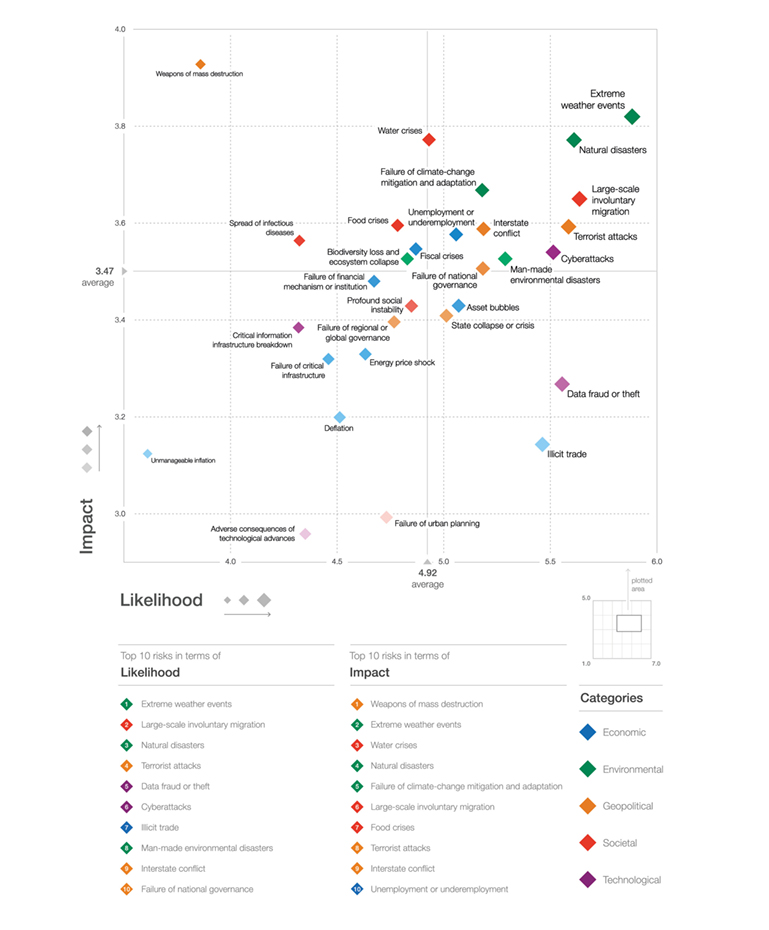
from The World Economic Forum Global Risk Report 2017 (12th edition)
The existential human challenge?
You might have your own candidate; here’s one to chew on:
Thriving on our generous, dangerous, fragile planet.
Of course, an assertion like that deserves a bit of justification. Again, chances are you can write a better one, or a counter-argument, but here’s a quick defense:
Some people might prefer a challenge that is a bit more centered on the individual, perhaps having dimensions such as self-actualization, the spiritual, peace-of-mind, and so on. There’s a good case for going in that direction, but let’s save that for another time. Here, the word thriving refers to all seven-plus billion of us, capturing the idea that to be human is to be social, part of a society, a collective, to be fully interdependent. Thriving not incidentally tries to capture the idea that if all of us aren’t thriving, then none of us is. In practice, you and I tend to anesthetize ourselves to problems of world hunger, poverty, disease, etc., because they seem so intractable and/or distant, but nonetheless, the goal is a thriving that everyone shares to some degree. And… a thriving that endures. Thriving connotes something ongoing, sustainable – as opposed to fleeting.
The second part of the challenge centers on our host planet. Remarkably, Earth bears all three of these attributes. To start, it’s wholly generous; any overview shows more than enough food, water, and energy to go around. We have distributional problems, but not some gross insufficiency.
Earth also remains intractably dangerous; if we needed any reminders, in the American hemisphere alone we’ve seen threats from wildfire to earthquakes to hurricanes over these past few weeks. No reasons for complacency or to feel secure here (and that’s before we get to man’s-inhumanity-to-man[1]).
Hard to believe, given the dangerous bit, but Earth at the same time is proving worryingly fragile. Each week, each month, each year, we keep seeing evidence that that same seven-plus billion of us, just by treading around, despite meaning no harm, are bit-by-bit degrading landscapes, habitats, waters, and the atmosphere, and compromising ecosystem services on which we depend.
That’s our threefold relationship with the Earth.
Which brings us to the diagram (the link takes you to the original; the version reproduced here is maddeningly difficult to read), which appeared earlier this year in the World Economic Forum publication The Global Risks Report 2017 (12th edition). You recall that the World Economic Forum sponsors that Davos meeting every January. (Think of it as a meeting of the tiny minority of the world’s people with the most to lose. So their assessment of risks ought to mean something.) As you see, the diagram shows impact increasing vertically, and likelihood increasing to the right. That means that the events that are most likely and ought to worry us the most are those in the upper right-hand portion of the diagram. Look closely (the figure is something of an eye chart), and this is what you find: At the uppermost, rightmost, are extreme weather events. Clustered nearby? Natural disasters; large-scale, involuntary mass migrations (many of which stem themselves from weather extremes, such as the Puerto-Rican migration to the U.S. mainland just getting underway); water crises; the failure of climate-change mitigation and adaptation, food crises; and manmade environmental disasters. A few other risks are thrown in, but these tend to be less frequent, or lower-impact – so, less worrisome.
Bottom line? The WEF Report reaches the essentially the conclusion stated above: the different facets of our relationship with the planet matter more and are proving more problematic than any dysfunction in our relationships with each other, shakiness in financial markets, etc. The WEF Report came out earlier this year, before recent events; therefore, to the extent it’s a bit of a forecast as well as a backward-looking assessment, it has verified. Though it’s always tempting to quibble with particular details, the WEF framing looks to be about right.
At this point, you may still feel that thriving on our generous, dangerous, fragile planet doesn’t quite hit the bar of existential. You may think it rises only to the level of, say, important. Whatever! We all agree such thriving matters. Therefore, if you participate anywhere in the space of Earth observations, science, and services; if you’re in emergency management, or agribusiness, or the energy sector, or water-resource management, or the building and operation of critical infrastructure – please take a moment to reflect on the worth of what you do.
And please keep it up! The rest of us need you.
Existentially.
______________
(with thanks to Dr. Mona Behl for recently passing along a link to the 2017 WEF Report, thus prompting this post)
[1] And please forgive the political incorrectness of this framing.

